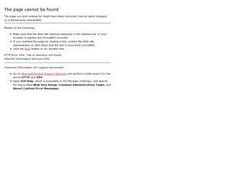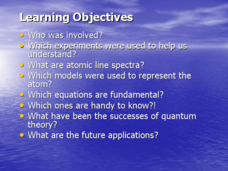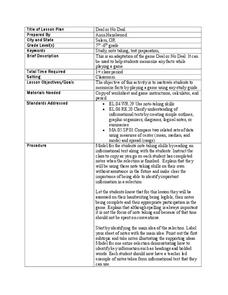Curated OER
Rhode Island Challenge
In this recognizing facts about the state of Rhode Island learning exercise, students read factual information and choose the who, what, or where answer. Students choose 10 multiple choice answers.
Curated OER
Apple of My Eye
Young scholars study apples. In this apple instructional activity, students read Apples by Gail Gibbons. Young scholars discover the life cycle of apples and determine the many uses of apples. Students write a list of factual information...
Curated OER
Writing Learning Logs
Students read a book about Abraham Lincoln. Using a log, they write factual information from the book. As a class, they discuss what they believe childhood was like in the middle to late 1800s. They fill out a KWL chart before beginning...
Curated OER
The Present Subjunctive: When?
Some Spanish learners believe the subjunctive is frightening. Help eradicate that fear by going into depth on when to use the present subjunctive. There are many different situations in which the subjunctive is used described here. You...
Curated OER
Lesson 1: Real People
A biography is a factual book or narrative about a real person. The book, The Story of Ruby Bridges is used to introduce non-fiction texts about real people and event to a Kindergarten class. A chart is used to highlight text features...
Curated OER
Crater Creation
After looking at the back of a quarter featuring Oregon terrain, learners distinguish between fiction and non-fiction and identify the beginning, middle and end of a story. First, they listen to legends that describe the creation of...
Curated OER
The Who's Who of Quantum Physics
This wonderful recap of powerful figures in scientific history includes pictures, important dates, and the information about their inventions or impact. Atomic structure and the photoelectric effect are introduced. The first slide gives...
Curated OER
Richard II-How Well Do You Know the Action?
Test your knowledge of the events of William Shakespeare's Richard II. Twenty-five multiple-choice questions are based on the factual information directly taken from the play.
Curated OER
Fact Cards
Young researchers respond to the statement, "Did you know..." by filling in factual information on a given topic on each card. Consider posting them on a special wall so that everyone can learn!
Curated OER
What is it...A Frog or a Toad?
Students write a story. In this frogs and toads comparison lesson, students read facts comparing frogs and toads, use a t-chart to record factual information and complete a Venn Diagram. Students complete a four square writing template...
Curated OER
Countries on the Internet
Students discover interesting and factual information about another country using the Internet and produce a flyer consisting of the information they find.
Curated OER
Louisiana
Third graders study factual information about Louisiana including the state flag, bird, tree, and important geographical points using the Internet and maps. They explain the different groups that settled the state in this mini-unit.
Curated OER
The Student Detective: A Textbook Investigation
Young scholars identify factual information using their textbook as a source of inquiry.
They become aware that a social studies text can be an object of historical investigation and develop a sense of questioning evidence as presented...
Curated OER
Effigy Mound Activity
Students research effigy mounds of Native people in Wisconsin. They create large models of effigy mounds in a given area based on factual information from their studies and research.
Curated OER
Evaluating the Validity of Information-Did the Chinese Discover America in 1421?
Students examine the discovery of the Americas. For this US History lesson, students investigate the theory that Chinese explorers initially discovered America. They collect research from a variety of sources, and distinguish between...
Curated OER
Fact or Opinion-Manatees
Students decipher factual information about manatees. In this biological science lesson, students research characteristics about manatees. They use that information to separate facts from common opinions about the animals. Students...
Curated OER
Publishing a Newspaper about Biomes
Young journalists create newspapers of individual biomes after researching their biomes. This instructional activity can be completed in three phases and concludes with each person publishing their individual newspaper pages.
Curated OER
Understanding Climate Change
The young scientists in your class will appreciate a resource about different elements of climate change. The packet includes factual materials, informational text, and clear visuals, perfect for sharing with your environmental science...
Balanced Assessment
Presidential Popularity
Media often misrepresent data and statistics to their advantage. This lesson asks scholars to analyze an article with misleading statistics. They use margin of error and mean data in their studies. Once they complete their analysis,...
Curated OER
Our Zoo Friends
First graders plan and create a model zoo depicting the natural habitats of animals. Their models include animals and a display of written factual information about the animals. Students present their project by conductig a tour of...
Curated OER
Deal or No Deal
Young scholars play a game in order to memorize any set of facts. In this memorization lesson, students play an adaptation of the game Deal or No Deal to help them review and memorize factual information. Young scholars also work on math...
Curated OER
Rosa Parks Refused to Do What?
First graders listen to two books about Rosa Parks. They contribute factual information for a web. They listen to an interview with Rosa Parks on the internet, adding more information to the web. They write and illustrate a book using...
Curated OER
Sounding Off About Impeachment
Help your middle and high schoolers reflect on the responsibility of newspapers to act as a vehicle for 'everyday citizens' to voice their opinions. Then, using an article about the first day of the Senate impeachment trial of President...
Curated OER
Factual writing: leaflets
Students identify persuasive words in provided leaflets. In this factual writing lesson, students complete an online activity. A worksheet is provided for extra practice.

























